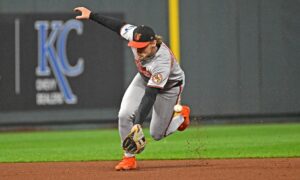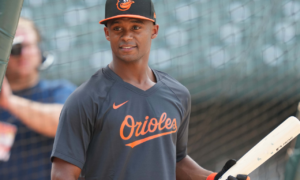SCROLL DOWN TO READ ARTICLE
It’s not every day that you circle an Orioles-San Diego Padres matchup on your calendar. But this week’s interleague series between the clubs holds special significance.
Manny Machado, the Orioles-drafted and developed star who helped key the franchise’s turnaround, will be returning to Oriole Park at Camden Yards for the first time as a visiting player. Machado, whom the Orioles traded to the Los Angeles Dodgers last July, signed a 10-year, $300-million deal with San Diego in February.
Machado, the No. 3 overall pick in the 2010 draft, was an instant sensation for the Orioles after jumping from Double-A Bowie to the majors in 2012. His Baltimore career included plenty of highlights — four All-Star appearances, two Gold Gloves and a litany of dazzling defensive plays — as well as some regrettable moments, including a bat-throwing incident against Oakland in 2014 and a suspension for charging the mound at Kansas City’s Yordano Ventura in 2016.
Machado isn’t the first former Orioles star to play against the club as an opponent, but he’s one of the most high profile.
CONTINUE READING BELOW
Only 12 players in Orioles history posted a better Wins Above Replacement with the club (per Baseball Reference) than Machado’s 30.9. Of those dozen, the top three spent their entire careers with the Orioles: Cal Ripken Jr., Brooks Robinson and Jim Palmer. Another, Mark Belanger, spent all but the last season of his 18-year career with the Orioles and never played against them.
The player just ahead of Machado on the list, longtime centerfielder Adam Jones, is slated to face the Orioles this year for the first time since leaving the club this past offseason. His Arizona Diamondbacks host the Orioles for a three-game series July 22-24.
That leaves seven Orioles of Machado’s caliber or better who left the club and later played against them. How did those star ex-Orioles fare when they faced their longtime club as an opponent?
Frank Robinson
We’ll start with a franchise superstar. The late Hall of Famer Robinson, one of six Orioles Legends to have his number retired and his likeness immortalized in the Camden Yards statue park, was one of only two of those to play for another team after his Baltimore stint.
CONTINUE READING BELOW
After transforming the Orioles into a perennial powerhouse during his six years with the team, leading them to their first World Series championship with his Triple Crown, MVP-winning season in 1966, Robinson was traded to the Dodgers in December 1971. A year later, he was back in the American League for his final four seasons of his playing career.
Robinson made his return to Baltimore with the then-California Angels on May 4, 1973. He doubled and scored the game’s only run in the seventh inning. Still, he batted just .159 against the Orioles that year. From 1973-76, first as an Angel and then a Cleveland Indian, Robinson posted a .248 average, .823 OPS, six homers and 15 RBIs in 38 games against the Orioles.
Appropriately enough, Robinson’s final game as a player came against the Orioles, on September 18, 1976. In the bottom of the eighth inning at Cleveland Stadium, Robinson delivered a pinch-hit RBI single off Rudy May, ending his career with 2,943 hits and 1,812 RBIs.
Boog Powell
Powell has been a mainstay of Baltimore baseball for so many decades, from his 14 years as a middle-of-the-order slugger to his eponymous barbecue stand at Camden Yards, that it’s hard to remember he had a non-Orioles career. But the four-time All-Star and 1970 AL MVP was coming off a subpar season by his standards when the Orioles traded him to the Indians in February 1975. The deal reunited him with his longtime Orioles teammate, Robinson, who was serving as player-manager for Cleveland.
Powell enjoyed a bounceback season in 1975, earning AL Comeback Player of the Year honors, but faded in his second year with the Indians and then spent one season as a pinch-hitting specialist with the Dodgers before retiring. During his stint with Cleveland, Powell played the Orioles 23 times, batting .230 with a .754 OPS, five home runs and 11 RBIs. Perhaps the most interesting faceoff was on June 17, 1975, when he hit two long balls against the Orioles — including back-to-back homers by Powell and Robinson in the second inning. Those accounted for all three Indians runs in a game won by Baltimore.
Paul Blair
An eight-time Gold Glover and the greatest defensive centerfielder in Orioles history, Blair was on the downside of his career when the club traded him to the New York Yankees in January of 1977. Prior to that, the Orioles were the only organization he’d known, aside from one minor league season with the New York Mets in 1962 before Baltimore plucked him in the Rule 5 draft.
Blair joined the Yankees at the right time. Though mostly serving as a reserve outfielder, he earned World Series rings for the club’s 1977 and 1978 championships. During his stint in New York, he played 13 games against the Orioles, going 10-for-32 (.313) with four RBIs. That included a Yankee Stadium tilt May 31, 1978, in which Blair drove in both New York runs with a double off Mike Flanagan, albeit in a losing effort.
Bobby Grich
The underrated Grich, an excellent all-around second baseman, deserved better than to fall off the Hall of Fame ballot after one year. His 71.1 career WAR was better than many players who have earned enshrinement in Cooperstown. He racked up more than half of that total during his seven years in Baltimore, winning four Gold Gloves, and continued his excellence for another decade after joining the Angels as a free agent in November 1976.
CONTINUE READING BELOW
Grich saw plenty of the Orioles after departing, playing 93 games against the club that made him a first-round draft pick in 1967. He batted .252 with a .765 OPS, 12 home runs and 39 RBIs. Grich was especially lethal to Orioles pitching in 1981, when he hit five home runs, delivered 11 RBIs and posted a 1.064 OPS in 11 games.
Eddie Murray
Much has been written about Murray’s messy divorce from the Orioles in 1988 after 12 memorable years, in which he’d garnered a World Series championship, a Rookie of the Year trophy, seven All-Star selections and seven top-10 finishes in the Most Valuable Player voting. The Orioles sent the future Hall of Famer packing in an ill-fated trade with the Dodgers.
Although Murray spent his first five post-Baltimore seasons in the National League, he took part in one particularly noteworthy game in the meantime: the debut of Oriole Park at Camden Yards in 1992. Granted, it was just an exhibition game (a dry run for the ballpark’s regular-season debut three days later), but Murray’s Mets christened the park as the visiting club April 3, 1992. Murray, in fact, drove in the first (unofficial) run in the ballpark’s history with a first-inning sacrifice fly.
Murray’s first regular-season appearance against the Orioles didn’t come until 1994, when he rejoined the American League with the Indians. In his second plate appearance against the Orioles, he blasted a two-run homer off Mike Mussina (who will be appearing later in this list) to lead an Indians win May 6. It was merely the beginning of Murray’s destruction of Orioles pitching that year, as he hit five home runs and collected 13 RBIs while batting .351 in 10 games. That included a two-homer game in Baltimore on July 28.
After Murray rejoined the Orioles for a stint in 1996, he finished his career with the then-Anaheim Angels in 1997 and played seven more games against Baltimore, managing just five singles in 27 at-bats (.185). All told, Murray batted .287 with an .831 OPS, six homers and 25 RBIs in 31 career games versus the Orioles.
Brady Anderson
October 6, 2001 was one of the most memorable nights in Camden Yards history. In front of 48,807 fans, Orioles legend Cal Ripken Jr. bid farewell to baseball and to his hometown team of 21 years, celebrating his final game with a special on-field ceremony.
Unbeknown to most at the time, the game also marked the Oriole finale of another Maryland-born franchise standout, Anderson. He concluded his 14-year Baltimore career as the club’s all-time leader in stolen bases (307) and ranked in the top five in hits, runs, doubles and triples. Anderson made the final out of that game, striking out in the bottom of the ninth with Ripken on deck.
Anderson latched on with the Indians for the 2002 season, facing the Orioles five times and going just 2-for-14. The Padres signed him to a minor league deal in 2003, but released him from Triple-A Portland in May, ending his career.
Mike Mussina
For many ex-Oriole stars, returning to Baltimore in a visiting uniform can be a welcome occasion, a chance for the player to soak up some adulation from an appreciative O’s crowd.
Then there’s Mussina.
To say the longtime Orioles ace received a mixed response in his first game as an opponent would be an understatement. Mussina’s decision to leave the Orioles in free agency after the 2000 season and sign with the division rival Yankees didn’t sit well with Baltimore fans. When he took the Camden Yards mound in pinstripes May 6, 2001, many in attendance taunted him with signs labeling him a sellout and a traitor. Others gave him a standing ovation in recognition of his 10 excellent years in Baltimore.
Mussina dominated the Orioles that afternoon, holding them to one run in seven innings in a 2-1 Yankees victory. That kind of performance, though, ended up being more the exception than the norm. During his eight years in New York, Mussina struggled to a 4.83 ERA in 26 starts against the Orioles, his worst mark versus any AL team.
Almost two decades after Mussina’s controversial departure from Baltimore, it appears both sides have let bygones be bygones. The Orioles elected Mussina to the club’s Hall of Fame in 2012, and he’ll be throwing out the first pitch on Sunday, June 30, in advance of his induction into the Baseball Hall of Fame this summer.
36 Comments
You must be logged in to post a comment Login or Register Here
Leave a Reply
You must be logged in to post a comment.










